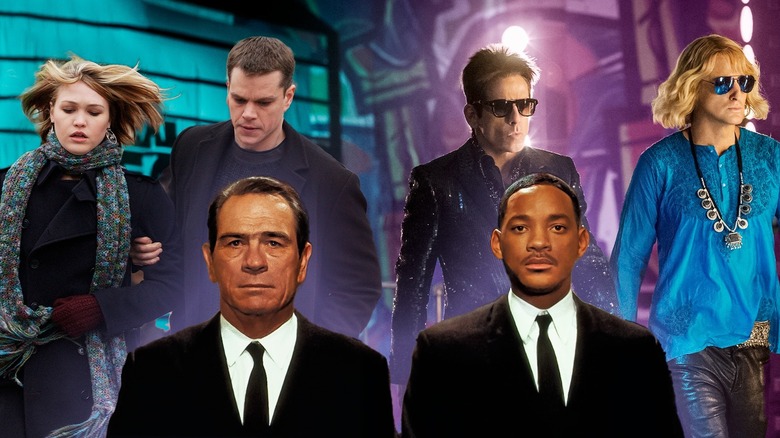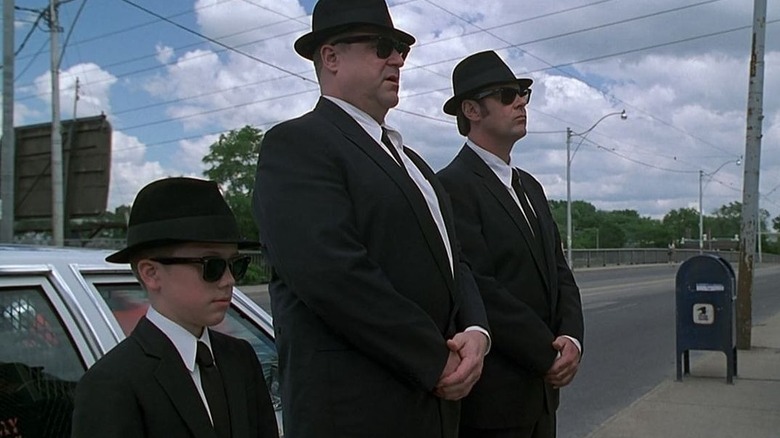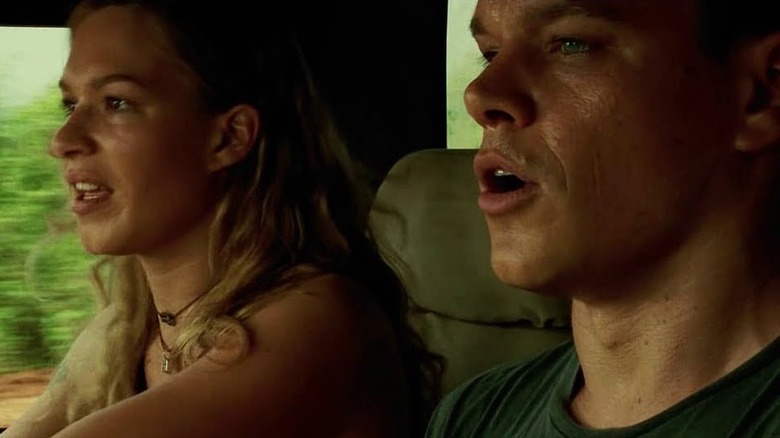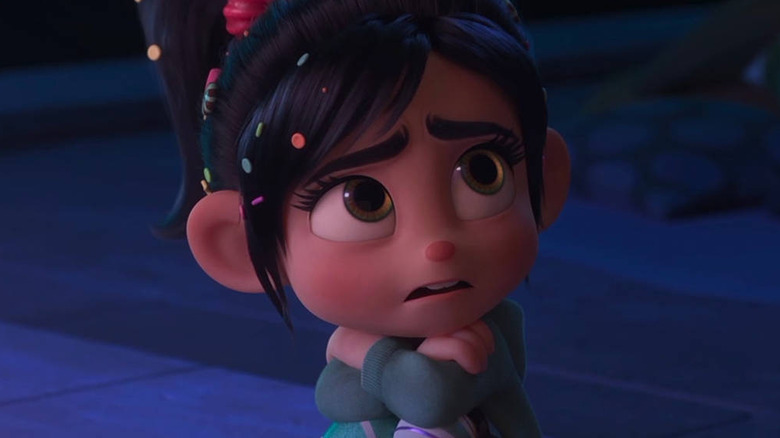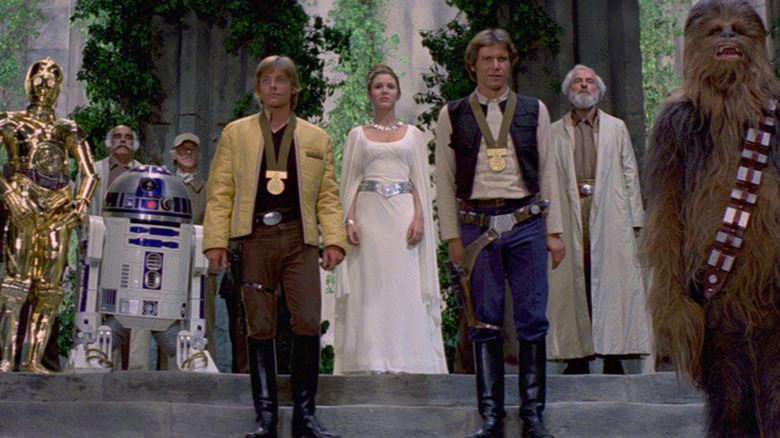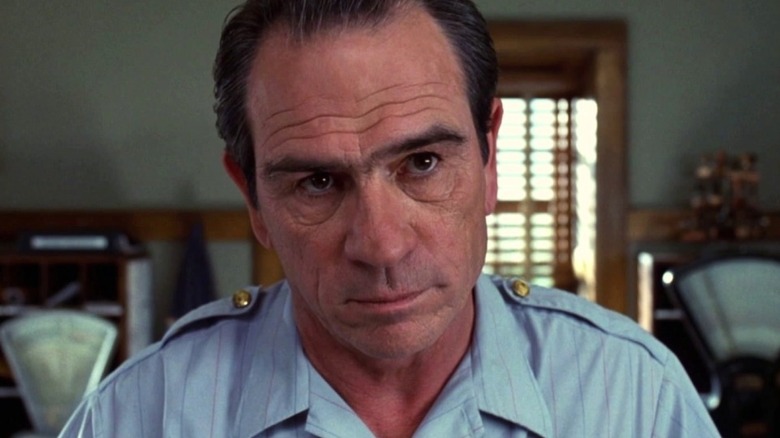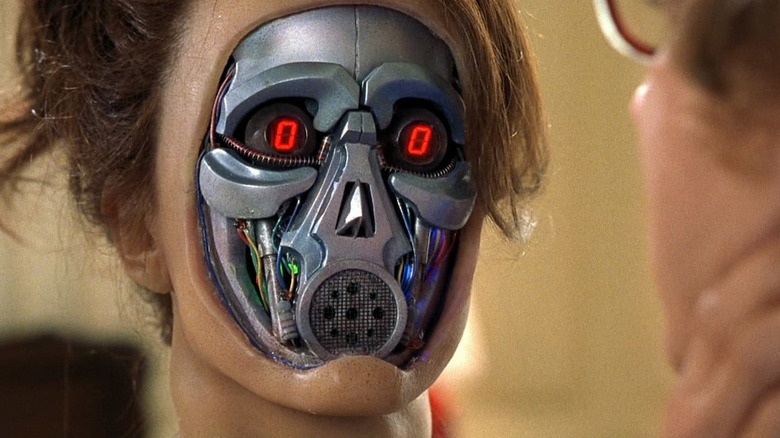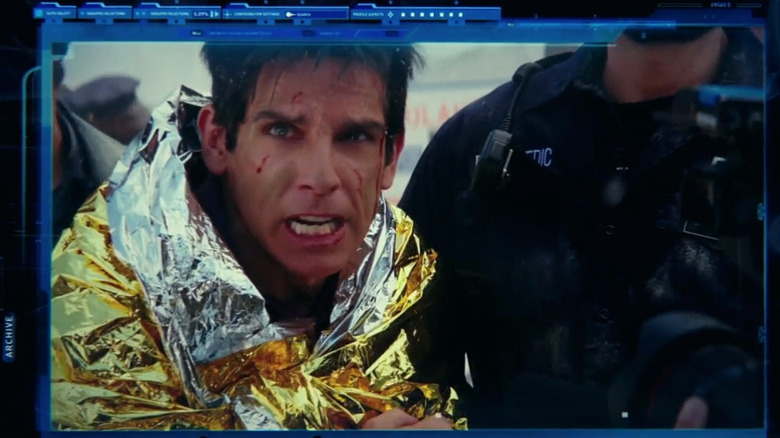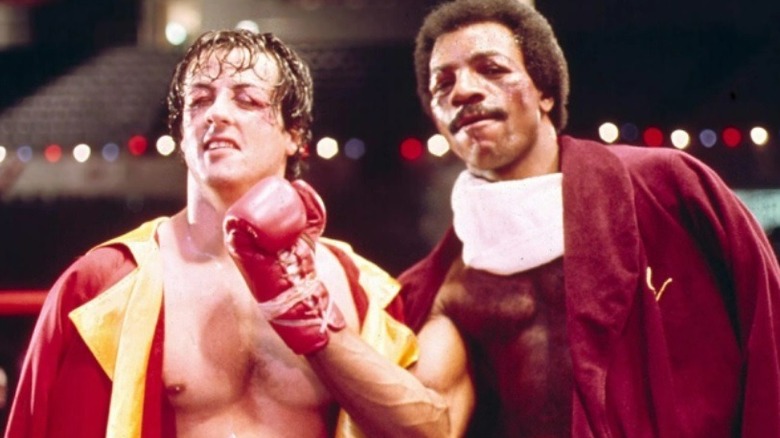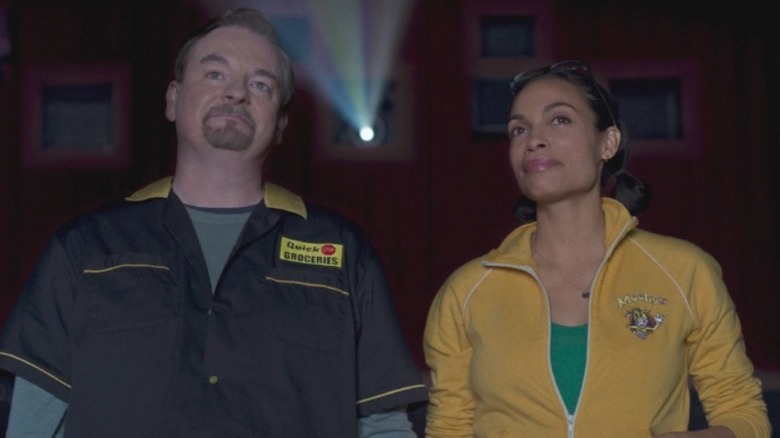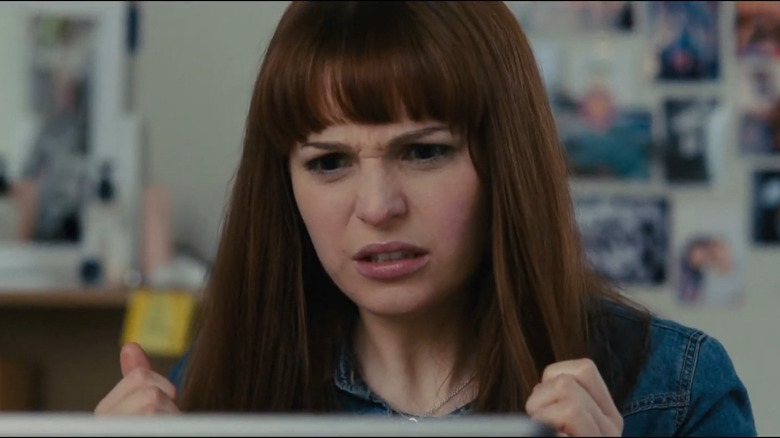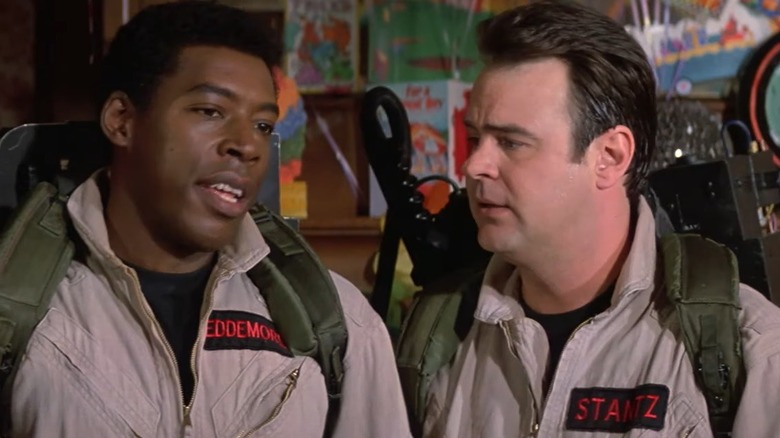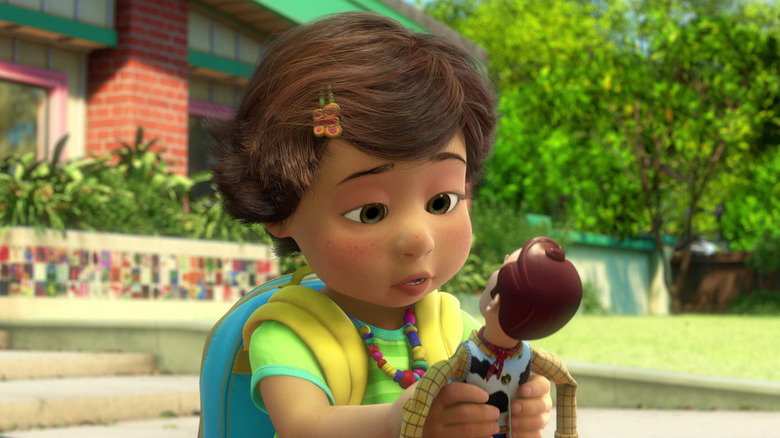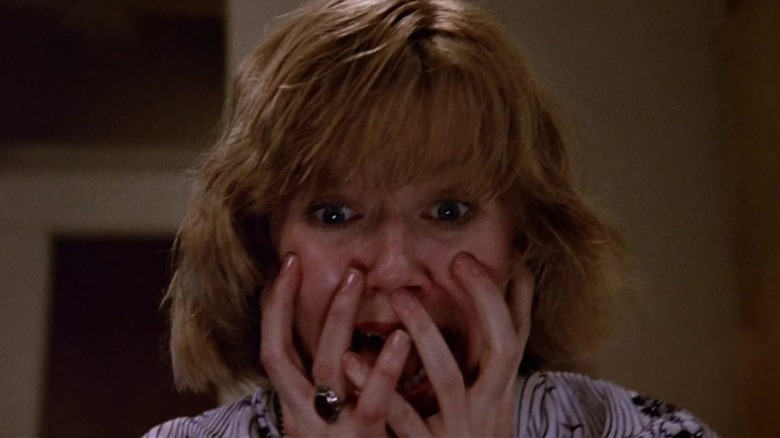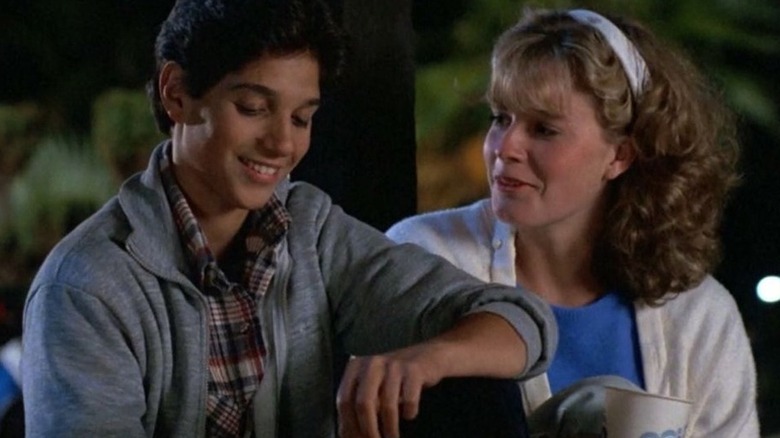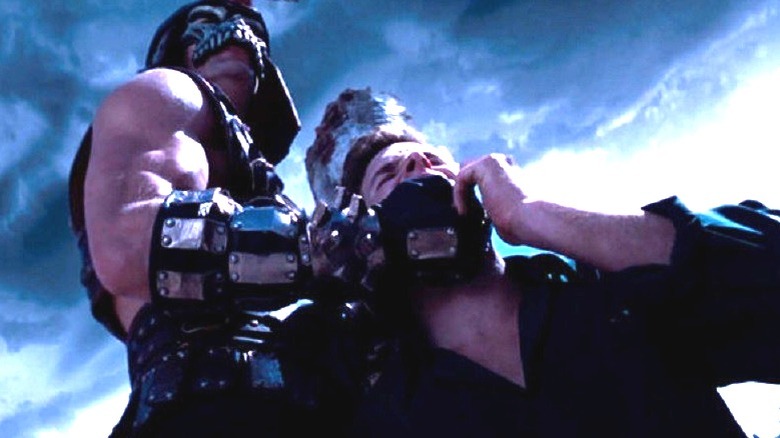Movie Sequels That Almost Immediately Ruin The Previous Film's Happy Ending
Without some sort of conflict, there isn't much point to a movie — and most end with said conflict being resolved in some way. One of the main exceptions to that rule is movies that were designed from the start to have sequels, in which case things are deliberately left hanging at the end. In that way, the sequel doesn't have to undo the previous movie's resolution and instead just comes up with a new one to build the next chapter around.
That being said, sometimes sequels find themselves painted into a corner, with one movie's resolution proving difficult to build a follow-up upon. When that happens, sequels often just decide to more or less cancel out various aspects of the previous film's ending — sometimes right out of the gate — to free up the sequel to introduce new conflicts without having to try and make them work alongside the previous resolution. It's all very complicated, and it's easy to see why film franchises like "James Bond" and game franchises like "Final Fantasy" mostly start fresh every time.
While there have definitely been sequels that found a way to justify their existence by building on the previous installment's ending, the following examples decided to more or less retcon the way their predecessors ended as a much easier way of taking care of the loose ends that would've otherwise threatened to tangle up the next entry.
Blues Brothers 2000
The entire point of Jake (John Belushi) and Elwood (Dan Aykroyd) Blues getting the band back together and eventually getting arrested — or in Jake's case, arrested again — in the original 1980 "Blues Brothers" movie was to help save their old orphanage from shutting down. In fact, its sequel, "Blues Brothers 2000," establishes that Elwood had to serve an 18-year prison sentence for the actions surrounding his journey to pay the overdue tax bill that kept the orphanage open.
What the opening scenes of this 1998 box office bomb also establishes is that the orphanage has since been demolished. In other words, the brothers Blues basically went to jail just to keep the orphanage open for a few more years at most — hardly worth the trade-off of having to spend nearly two decades in jail. Finishing off the one-two punch that completely sours the previous movie's ending is Elwood being informed that Jake has died. Sure, that was to be expected as Belushi had long since passed away, but it doesn't make the start of what is supposed to be a musical comedy adventure any less depressing.
The Bourne Supremacy
Jason Bourne (Matt Damon) has really been through it over the course of the action franchise, having an entire government agency trying to capture him while also avoiding being killed by various other groups. At least he got the girl in the first movie, 2002's "The Bourne Identity," so he could have someone by his side as he continued to elude detainment and or death while also just trying to learn who he actually is.
Well, the first sequel — 2004's "The Bourne Supremacy" — decided to take that away from him. Not only that, but poor Marie (Franka Potente) is killed in a car crash fairly early on in the movie, preventing the couple from having any measurable amount of romantic time together. It seemed like a needlessly cruel thing to do to a character that already had a tragic backstory to build upon even without killing his girlfriend on top of everything else.
Ralph Breaks the Internet
The two main protagonists of 2012's "Wreck-It Ralph" – Ralph (John C. Reilly) and Vanellope von Schweetz (Sarah Silverman) — are both feeling like they don't belong in their own respective arcade games. Over the course of the movie, they each learn how to make a living in their games on their own terms. Ralph in particular goes to great lengths to help Vanellope discover that she isn't just a glitch and is very much a part of "Sugar Rush," finally making her feel like she belongs.
Then comes the 2018 sequel, "Ralph Breaks the Internet," where we find that Vanellope is already feeling bored by "Sugar Rush" and ends up causing the game's steering wheel to break as a result of her trying to rebel against a player's input. What starts out as a movie about Ralph helping Vanellope find a way to fix "Sugar Rush" quickly becomes about him finding a loophole that would let her move to a completely different game instead — the more exciting "Slaughter Race." Even after "Sugar Rush" is fixed, Vanellope decides to stay in "Slaughter Race" instead, essentially rendering all the lessons learned and rules established in the first movie moot.
The Empire Strikes Back
In hindsight, it might seem like a no-brainer that the victory celebration at the end of "Star Wars" was going to be short-lived. But at the time, when the movie was mostly known as "Star Wars" — rather than "Star Wars Episode IV: A New Hope," a film with eight more mainline installments plus a couple of side films to follow — it wasn't necessarily a foregone conclusion that a sequel was in the stars. That "A New Hope" ends the way it does, with a lavish ceremony in which the heroes are awarded medals for dispatching the bad guys and the credits roll right from there, is proof of that.
So the mere fact that the 1980 sequel, "The Empire Strikes Back," even existed at all immediately showed that awarding Luke (Mark Hamill) and Han (Harrison Ford) awards for seemingly beating the Empire was premature, to say the least. With each successive sequel that showed things in the galaxy getting worse and worse, the lavish ceremony that ends "A New Hope" has felt progressively more jarring and out of place.
Men in Black II
The 1997 film, "Men in Black," opens with Agent K (Tommy Lee Jones) on a mission with his longtime partner, Agent D (Richard Hamilton). After D fumbles with his weapon and needs K to save him, D realizes he's too old for galaxy saving and decides to retire. Things then come full circle by the end of the film, with K revealing that he had been training a replacement rather than a partner in Agent J (Will Smith) — finally getting to return to his old life and the wife he had left behind over 30 years prior. Among the images at the end of the movie is a newspaper headline that shows the happy couple reunited at last.
Despite the first movie setting up that J's new partner was going to be Agent L (Linda Fiorentino), things didn't work out that way. Fiorentino didn't return for 2002's "Men in Black II," and instead, Jones was brought back to reprise his role as Agent K to reteam with Agent J once again. Sadly, in-universe, this means that Kevin Brown — K's real name — had to be pulled out of retirement and once again leave behind the wife that he was frequently shown pining after in the first movie.
Austin Powers: The Spy Who Shagged Me
With Austin Powers (Mike Myers) being a parody of James Bond and other movie spies of the 1960s and '70s, it was to be expected that he wasn't going to stay settled down with Vanessa Kensington (Elizabeth Hurley) despite the 1997 movie ending with their marriage. Besides, we had already seen the trailers and commercials for the 1999 sequel, "Austin Powers: The Spy Who Shagged Me," which featured a whole lot of Felicity Shagwell (Heather Graham), so clearly, Vanessa had to be pushed aside to allow for Austin and Felicity to hook up.
And pushed aside Vanessa was, in the very first scene of the movie, where we join the couple in the throes of wedded bliss on their honeymoon only to discover that Vanessa is actually a Fembot who then tries to kill Austin. She was apparently a Fembot all along, somehow, despite being the daughter of his partner back in the 1960s and — well, as Basil Exposition himself would say, it's best to just enjoy these movies and not worry too much about such conflicting details.
Zoolander 2
The mid-2010s were a dark time for movie sequels, seeing cult favorites like "Anchorman" and "Joe Dirt" dusted off for extremely disappointing follow-ups. Also part of that trend was 2016's "Zoolander 2," in which Ben Stiller returned as the titular supermodel. The 2001 original, "Zoolander," received only a lukewarm critical reception and didn't exactly set the box office on fire like so many supermodels carelessly frolicking in gasoline, but it obviously had enough fans that Stiller wanted to do a sequel 15 years later and was able to convince a bunch of his celebrity friends to join the cast as well.
For whatever reason, Stiller and his co-writers decided to start the movie by having the Derek Zoolander Center for Kids Who Can't Read Good and Who Wanna Learn to Do Other Stuff Good Too collapse — and in the process, kill his girlfriend, Matilda (Christine Taylor). And it isn't as if Taylor didn't want to or was unable to be in the movie, as she reprised her role as Matilda's ghost, which makes the decision to murder her and immediately end their just-beginning relationship even more strange.
Rocky II
"Rocky II" as a whole feels like an undoing of everything that made the original movie special. In the first film released in 1976, Rocky Balboa (Sylvester Stallone) winning was never the point. It's not considered a disappointing or downer ending that he doesn't triumph in the big final bout, because it's not supposed to be about that. Here was this total underdog, not even a professional boxer up to this point, holding his own for 15 full rounds and even giving opponent Apollo Creed (Carl Weathers) his first-ever knockdown. Rocky gives Apollo a good fight, and that's all that matters. The two even reach mutually respectful — even friendly — terms and agree to never have a rematch.
And then comes 1979's "Rocky II," which immediately goes about setting up the rematch that was never supposed to happen, all so Rocky can actually beat Apollo at the end of the film. Not unlike what happened with Stallone's other big franchise from that era, with the very grounded and human story of "First Blood" making way for the more cartoonish and over-the-top "Rambo" sequels, subsequent "Rocky" movies get progressively further away from what made the original and its perfect ending still the best in the series by a long shot.
Clerks III
Perhaps it was asking too much to let Dante Hicks (Brian O'Halloran) catch a break, as his being beaten down by life at every turn is basically what defines him as a character in the "Clerks" franchise. Still, fans thought that maybe he had at least finally gotten his love life situated by the end of 2006's "Clerks II," leaving behind the fiancée he clearly wasn't right for in favor of Mooby's boss, Becky (Rosario Dawson). Between getting engaged to Becky and starting a business with his best friend Randall (Jeff Anderson), "Clerks II" actually seemed to be setting up a pretty good life for Dante.
Despite commercials and trailers for 2022's "Clerks III" featuring Becky, and Dawson being among the announced returning cast members, we learn in the opening minutes of "Clerks III" that Becky was killed by a drunk driver in the time that had passed since the events of "Clerks II." To make things even more tragic, we also learn that she was pregnant with the couple's child at the time. Filmmaker Kevin Smith has never been afraid to take his comedies into dark territory, but this might have been the saddest twist he has ever put into one of his films — and that's saying a lot.
The Inbetweeners 2
Starting off as a late-2000s BBC sitcom, "The Inbetweeners" made the jump to the big screen with "The Inbetweeners Movie" in 2011. The film sees the still-teenaged boys from the show — Will (Simon Bird), Jay (James Buckley), Neil (Blake Harrison), and Simon (Joe Thomas) — continuing their coming-of-age misadventures through life and love. By the end, they've finally all found girlfriends at the same time, with the four couples going on vacation together and then coming home to the ladies meeting the guys' parents.
Fast forward three years, and "The Inbetweeners 2" sees the boys a few years older and once again embarking on a travel-based adventure together. Only now, three of the four girlfriends are long gone, with only Simon still remaining with the girlfriend he had at the end of the previous movie. As if it wasn't already disappointing enough to rob three of the guys of long-term relationships, Simon's girlfriend, Lucy (Tamla Kari), has done a complete 180 and is now angry, obsessive, and worst of all, abusive towards Simon. Critics noted how much more mean-spirited the sequel was over the previous film and series, generally agreeing things should've ended after the first movie.
Ghostbusters II
The 1984 original "Ghostbusters" ends with the titular team having not only saved New York City but basically the entire world from an army of afterlife ghouls. Once it had become common knowledge that ghosts were real and that these guys had the means to effectively bust them — and ghosts being the type of threat that will be an ongoing concern indefinitely — the Ghostbusters should've been able to keep plenty busy and remain forever respected for their past, present, and future heroics.
1989's "Ghostbusters II" opens with the words "5 Years Later" plastered across the screen rather ominously, and starts with the first hint of the spectral slime that is going to soon be the driving force behind the movie and will surely require the 'Busters to be called into action. But that scene is immediately followed by another that sees Ray (Dan Aykroyd) and Winston (Ernie Hudson) resorting to performing at children's birthday parties to make ends meet. Moreover, the kids are not impressed and even boo the two men — immediately establishing that the team is already viewed as lame has-beens despite all they did in the previous film and should, at the very least, still be heroes to children.
Toy Story 4
In one of the most heart-tugging — not to mention perfect — movie endings of all time, 2010's "Toy Story 3" wrapped up Pixar's first trilogy with Andy playing with his beloved toys one last time before passing them on to Bonnie, comforted to know that she would love and play with them for many years to come. Andy looking back at Woody one last time as he drives away is the kind of moment that requires a hard swallow whether you're seeing it for the first time or the tenth.
While the overall consensus is that 2019's "Toy Story 4" ended up somehow justifying its existence despite how perfectly "Toy Story 3" wrapped things up, there's little denying how upsetting it is that "Toy Story 4" almost immediately rendered the emotional gut-punch of the "Toy Story 3" ending completely worthless. We catch back up with Bonnie only a short time later, and she's already over Woody, Buzz, and many of Andy's old toys. We were left to assume that the gang was going to get Andy-esque levels of attention for most of Bonnie's childhood — until her pre-teen years at the very least — only to discover that she had already shoved them in a closet.
Friday the 13th Part 2
Once horror movie sequels became commonplace, it was rare that they ended on any kind of an overwhelmingly positive note as filmmakers always had to leave that dangling thread of a possible return of the villain. But horror sequels weren't always a given, and as a result, the first installment of many future franchises ended in such a way as to allow for a final girl to survive to the end with the presumption that she'd either live happily ever after or at least return to flee another day in subsequent entries.
Take 1980's "Friday the 13th" for instance, with Alice Hardy (Adrienne King) getting the chance to survive Mrs. Vorhees's rampage at Camp Crystal Lake. However, instead of getting to be an ongoing presence in the series in the same vein as Laurie Strode ("Halloween") or Sidney Prescott ("Scream"), Alice takes an icepick to the temple in the opening scene of 1981's "Friday the 13th Part 2" and goes from the final girl in one movie to the first death in the sequel.
The Karate Kid Part II
Daniel LaRusso (Ralph Macchio) was fighting for a lot of things in the first "Karate Kid" movie released in 1984 — confidence, respect from his peers, praise from his sensei — but perhaps most crucially, he was seemingly fighting for the right to date a girl named Ali Mills (Elisabeth Shue). Like a true 1980s underdog movie, Daniel eventually wins both the All Valley Karate Tournament as well as the girl. No, a woman shouldn't be a prize to be won — but, again, this was a movie in the 1980s.
Come "The Karate Kid Part II," and it turns out that Ali wasn't his prize to keep anyway. She's nowhere to be seen in the 1986 sequel or its 1989 follow-up, with only brief mention of her having left Danny on prom night for a college football player. Fortunately, Ali's reputation would later get some much-needed redemption when she showed up in the "Karate Kid" sequel series, "Cobra Kai," to finally give her side of the story about her breakup with Daniel. Macchio admitted in a 2022 interview with The Guardian that he regrets having not advocated for Shue at the time when producers decided not to ask her back after the first movie.
Mortal Kombat: Annihilation
Whenever there is talk about how terrible movie adaptations of video games typically are, it's because movies like "Mortal Kombat: Annihilation" set the bar so very, very low fairly on in the lifespan of video game movies. It's especially disappointing because the original 1995 "Mortal Kombat" movie was actually pretty good, and was the first inkling that movies based on video games could be halfway decent if handled properly.
While "Mortal Kombat" already has its own happy ending spoiled in that movie's final moments, with Shao Khan interrupting the victory celebrations to set the stage for his attack in the inevitable sequel, 1997's "Annihilation" still took things to another level. To be specific, Shao Khan (Brian Thompson) murders Johnny Cage (Chris Conrad), one of the original movie's main heroes, literally minutes into the sequel — which specifically ruins the hard-earned budding relationship between him and Sonya Blade (Sandra Hess). The "Mortal Kombat" film franchise itself was also murdered by this movie and would take an astounding 24 years to be resurrected with the 2021 reboot.
